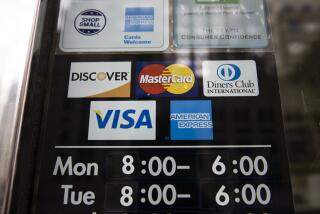Bankrupt of Compassion
- Share via
The bankruptcy bill that passed a key vote in the Senate on Tuesday is driven by the premise that the nation is under siege by an army of deadbeats running up credit card bills, declaring personal bankruptcy and sticking honest Americans with the tab. That’s the credit card and banking industries’ story, and they’re sticking to it. We can all guess who will profit from the bill.
The number of bankruptcies did double during the last decade, and 1.4 million more are expected this year. Some of those doubtless came from people who could have paid their debts, and cracking down on them is a fine idea. But then there are people like Ruth M. Owens of Cleveland, who, according to a Times report by Peter Gosselin, paid Discover Bank $3,492 over six years on a $1,963 debt, only to end up with a balance of $5,564 because of late fees and finance charges -- a sum the disabled woman living on Social Security found impossible to pay.
The proposed Bankruptcy and Abuse Prevention and Consumer Protection Act of 2005, despite rhetoric served up by credit card companies, banks and retailers, does a poor job of distinguishing between deadbeats and people like Owens, who are overwhelmed primarily by two things: high healthcare costs and credit card interest rates that can be as much as 30% for those with poor credit.
A study released in February by the Harvard medical and law schools suggests that nearly half of all personal bankruptcy filings result from medical problems that disrupt household finances. That’s more proof of the need for vast healthcare reform, but hardly evidence of bankruptcy abuse by deadbeats.
Further, credit card companies have reported steadily increasing profits even as bankruptcy filings have risen. They have done this by eagerly offering credit cards to people with poor credit histories, and charging fees and interest rates high enough to offset the risk. Except, of course, the risk that people will drown in spiraling interest costs.
The real spirit of the bill was made brutally clear in a series of votes that culminated on Tuesday. Senators have embraced what critics call the “millionaire loophole,” which would let rich Americans establish trusts to keep their assets safe from creditors. As for the ordinary Joes? The lawmakers would make it harder for them to get free and clear, meaning they’re more likely to be saddled with debts beyond their means. And the senators also rejected an amendment to help old people keep their homes.
The bill is likely to pass in the House, given the failure Tuesday of a Democratic-backed amendment to prevent antiabortion activists from using bankruptcy to avoid paying court judgments. The bankruptcy bill casts its net far beyond the profligate, and it has a big hole through which only the rich may pass. It is a mean-spirited sham.
More to Read
Inside the business of entertainment
The Wide Shot brings you news, analysis and insights on everything from streaming wars to production — and what it all means for the future.
You may occasionally receive promotional content from the Los Angeles Times.










